Key takeaways:
- Conflicts in bands often stem from differing artistic visions, egos, and external pressures, making communication essential for resolution.
- Financial disagreements and varying commitment levels can escalate tensions, emphasizing the need for clear expectations and empathy among members.
- Conflicts can lead to creative breakthroughs and personal growth, revealing the potential for artistic depth and stronger collaboration.
- Establishing open dialogue and regular check-ins fosters trust and helps prevent misunderstandings, enhancing group dynamics.
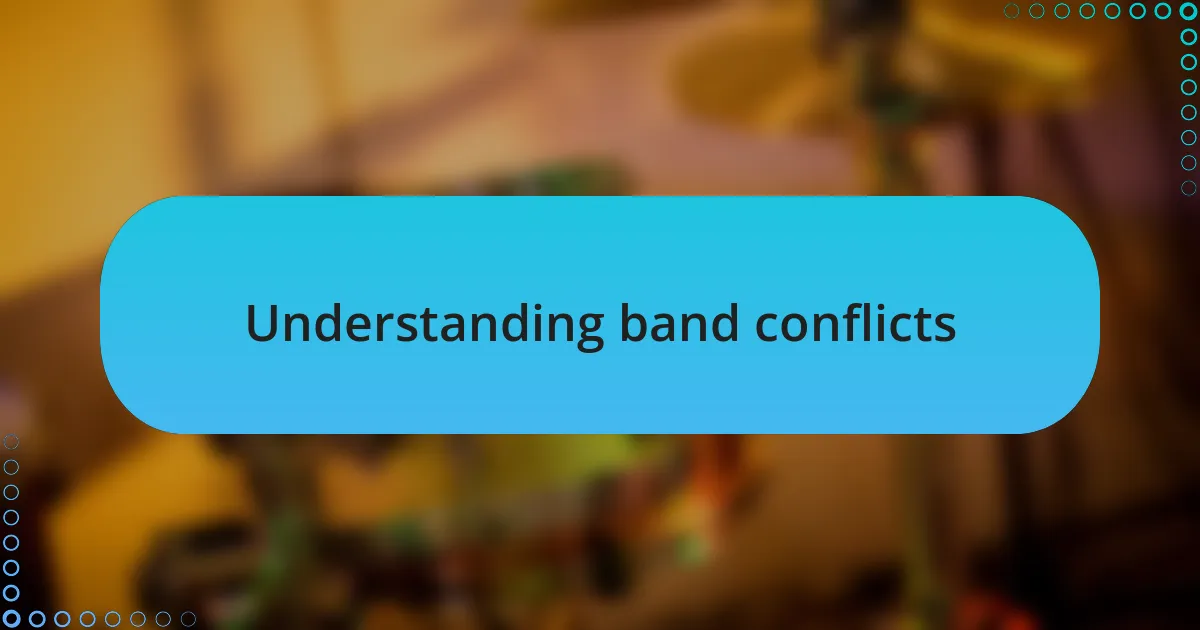
Understanding band conflicts
Conflicts in bands often arise from differing artistic visions or egos clashing. I remember a time when our original song sparked a debate about its direction; some members envisioned a heavy rock sound while others preferred a softer approach. It made me wonder, how can creativity coexist when opinions diverge so widely?
Communication is crucial in resolving these conflicts. I’ve seen bands benefit from setting aside time to listen to each other’s perspectives. Instead of arguing over who’s right, why not focus on understanding the underlying emotions? This shift can turn tension into collaboration, fostering an environment where everyone’s creativity can flourish.
Another layer to consider is the pressure of shared goals and performances. I’ve felt the weight of expectations during rehearsals, and it can lead to frustration. Have you ever felt like you were pulling the band in a different direction because of personal stresses? Navigating those moments requires empathy and patience; I’ve found that acknowledging everyone’s struggles helps to create a healthier band dynamic.
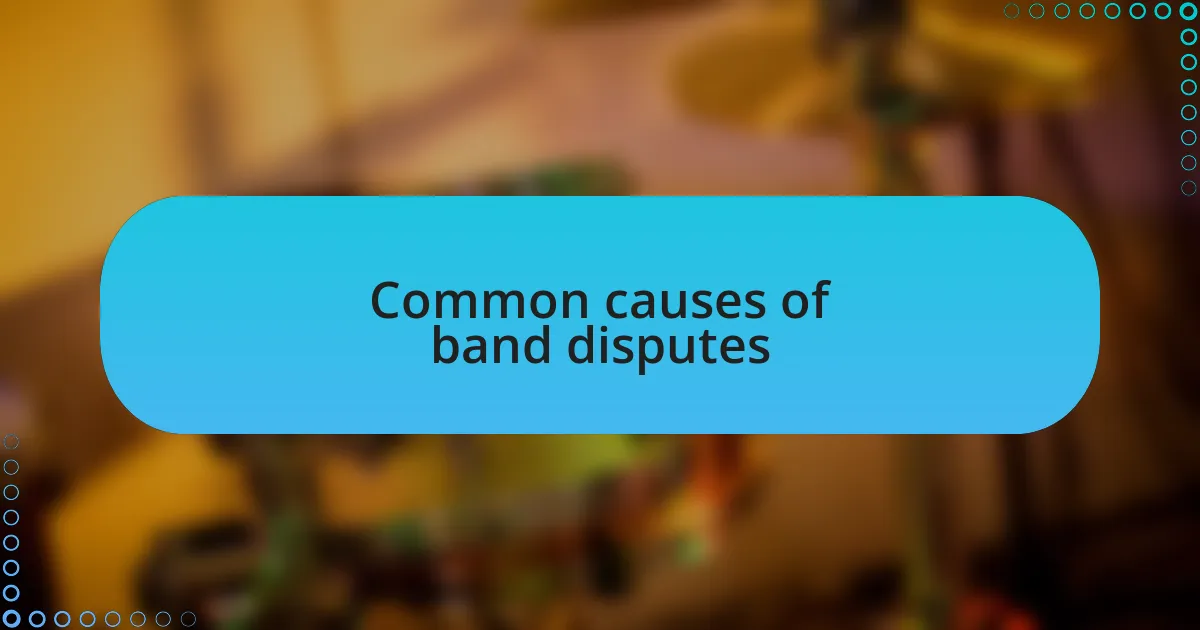
Common causes of band disputes
Disagreements over finances are often a breeding ground for conflict within bands. I recall a situation where we had to dig into our earnings from a local gig. As we discussed how to split the proceeds, differing opinions, particularly on what constituted fair compensation for each member, led to heated discussions. It was a wake-up call for me—money can easily complicate relationships that are built on passion and creativity.
Another common source of disputes is differing work ethics and commitment levels. There was a time when I noticed one band member consistently missing rehearsals, citing personal issues like work commitments. I felt frustrated, as we were all putting in the effort to make our dream a reality. Have you ever felt like you were carrying the entire band? That experience made me realize how crucial it is to establish clear expectations from the start to avoid such frustrations.
Finally, personal conflicts stemming from outside relationships can spill over into band dynamics. I once encountered a situation where a member was facing challenges in their personal life, affecting their mood and performance. It led to misunderstandings among us, as frustrations bubbled over in rehearsals. I learned that keeping an open line of communication about personal challenges can mitigate the impact these issues have on the group. How can we support each other better? These reflections have often inspired me to be more compassionate and understanding as we all navigate life together.
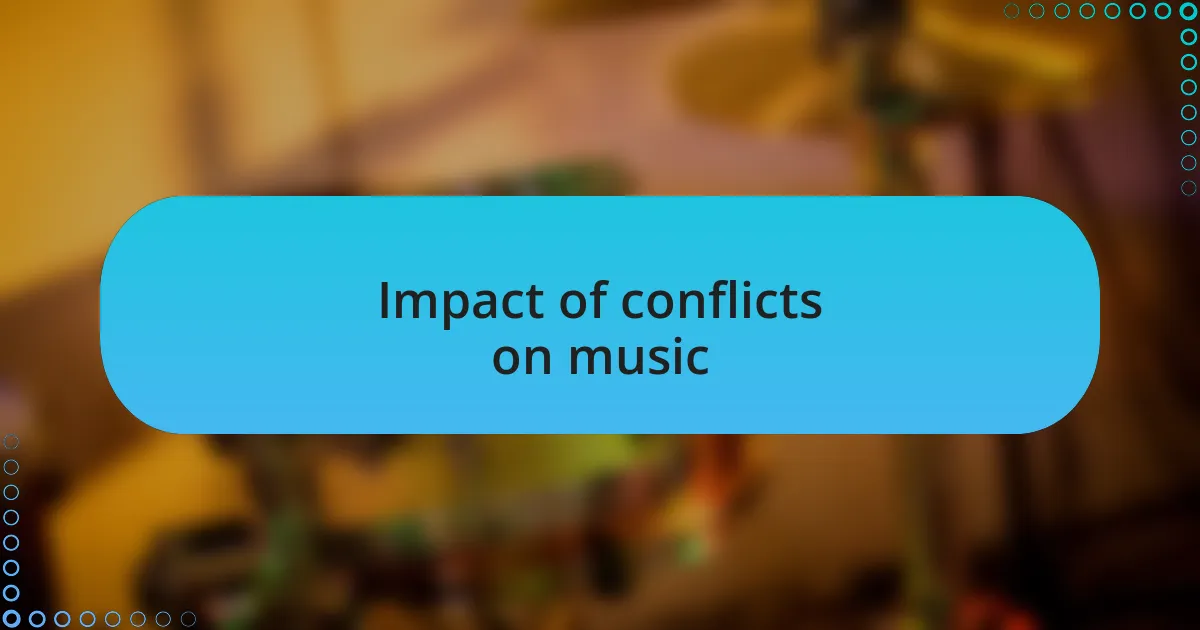
Impact of conflicts on music
Conflicts can profoundly shape the music produced by a band. I remember one time when we hit a creative snag after a major disagreement about the direction of a song. The tension in the room was palpable, and for a while, it felt like we were stuck in a musical limbo. But paradoxically, that conflict pushed us to explore new ideas we’d never considered before, leading to a more innovative sound. Have you ever stumbled into a creative breakthrough during a disagreement?
Moreover, the emotional turbulence stemming from these conflicts often seeps into the music itself. During a tumultuous period in our band, I found that our lyrics became rawer and more authentic, reflecting the chaos we felt. Instead of shying away from our struggles, we channeled them into our work. It made me realize: can the intensity of a conflict actually contribute to artistic depth?
Finally, conflicts often serve as a catalyst for personal growth within each member. I gained a deeper understanding of my bandmates’ perspectives and, as a result, honed my skills in collaboration. One disagreement taught me the importance of compromise, ultimately strengthening our bond. Have you thought about how conflict can lead to self-discovery? It’s fascinating how navigating tensions can enhance not only the group’s dynamic but also individual artistry.
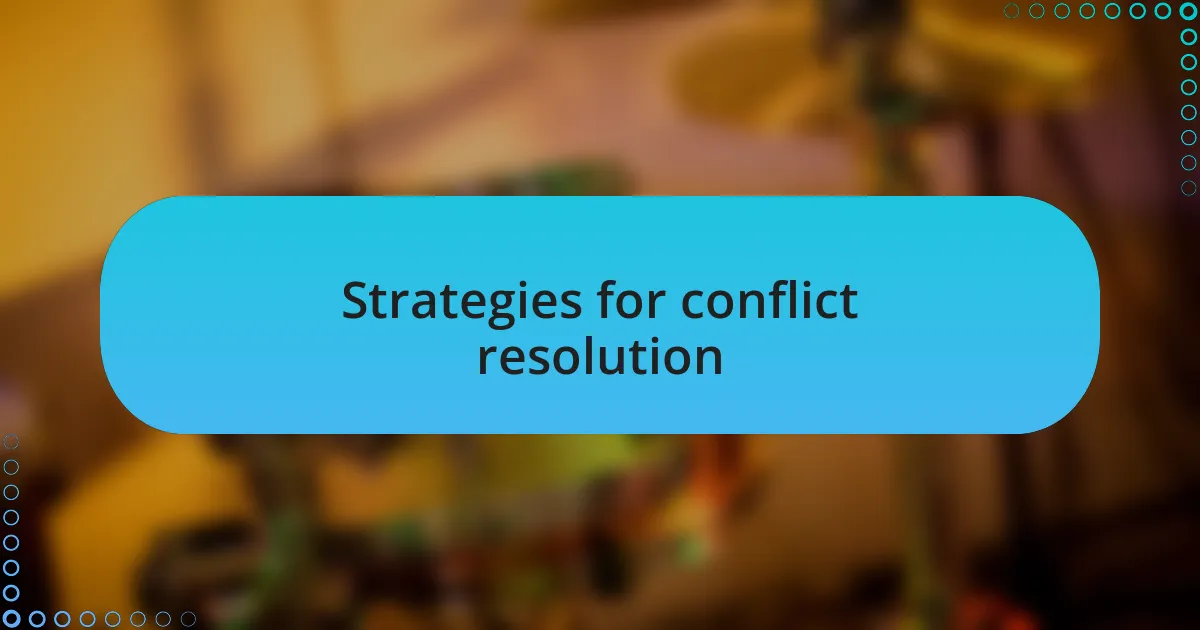
Strategies for conflict resolution
Finding effective strategies for conflict resolution in a band can truly transform the dynamic between members. In my experience, taking a step back and allowing each person to voice their opinions freely helped diffuse tension. I remember a time when we were at an impasse over lyrics. Instead of arguing, we decided to hold a brainstorming session, where everyone wrote down their ideas anonymously. This not only helped us gather fresh perspectives but also fostered a sense of respect for each other’s contributions. Doesn’t it feel reassuring to create an environment where everyone feels heard?
Communication is vital in resolving conflicts. During one particularly heated discussion about our setlist, we took a break to discuss how we were feeling rather than sticking to the agenda. I found that sharing emotions opened doors to understanding each other’s motivations. Listening actively helped us move beyond the surface disagreements. Have you noticed how simply opening up can make a significant difference in relationships, especially in creative environments?
Another crucial strategy is to establish clear roles and boundaries. Early in my band journey, we faced misunderstandings over songwriting contributions, which often spiraled into conflict. By defining each member’s responsibilities, we minimized overlaps that usually led to frustration. It was enlightening to see how clarity can preemptively heal potential discord. Have you ever considered how a well-structured approach might prevent a lot of unnecessary conflicts in your own band?
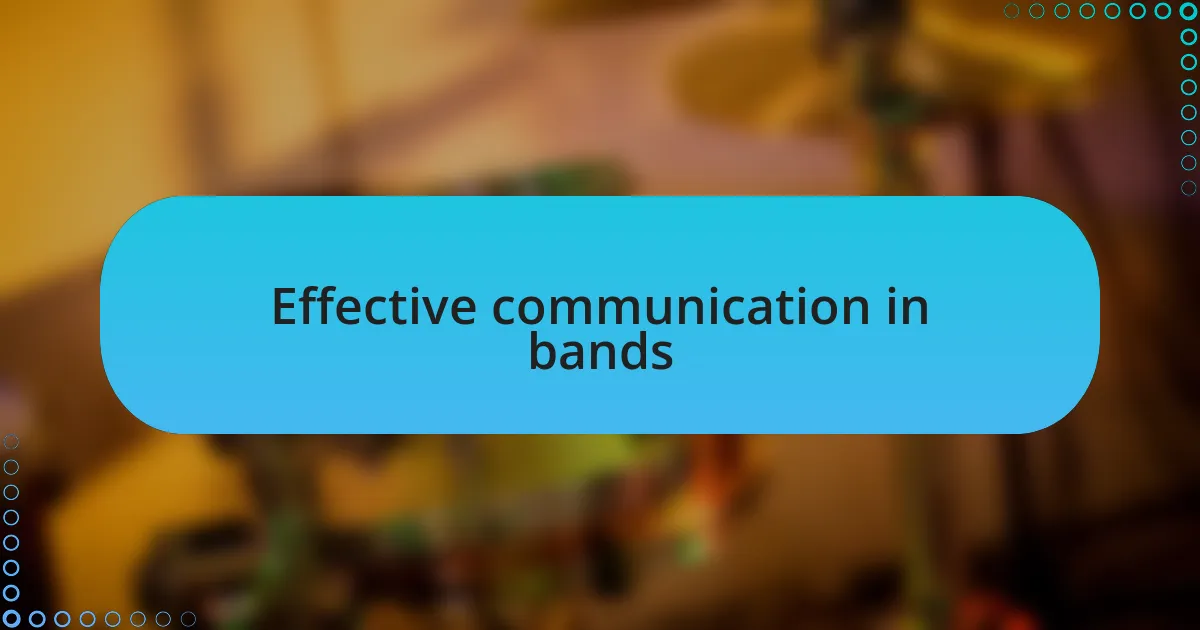
Effective communication in bands
Effective communication in bands is more than just talking; it’s about truly connecting with one another. I once experienced a time when one member consistently felt overshadowed in meetings. After some heart-to-heart conversations, we realized that ensuring everyone had a chance to contribute made a profound difference. Have you ever witnessed the power of giving someone a voice?
I also learned that tone and delivery matter immensely. During a rehearsal, I remember a time when I mistakenly criticized a bandmate’s playing style. My intention was constructive, but without careful phrasing, it felt like an attack. After realizing the impact of my words, I started framing feedback positively, focusing on strengths first. Does your band practice a similar approach to feedback?
Furthermore, regular check-ins can foster an atmosphere of trust. I began implementing weekly sessions where we could discuss not just our music, but how we were feeling about our dynamics. This openness not only improved our collaboration but allowed us to tackle issues before they escalated. Have you thought about how such simple routines might change the vibe in your own musical group?
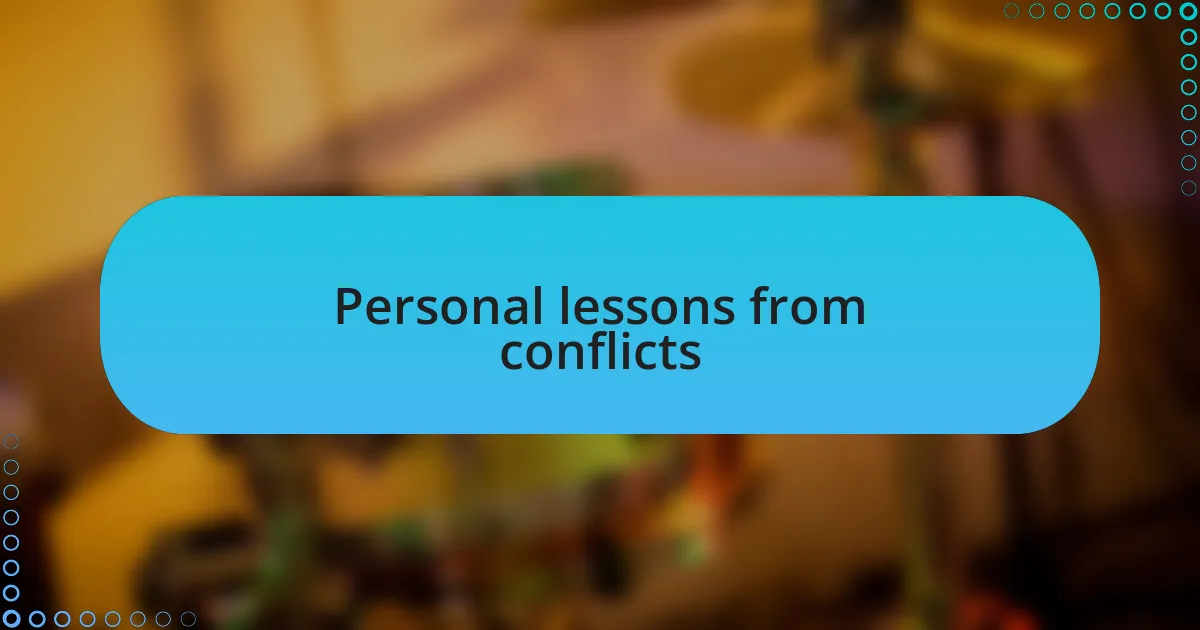
Personal lessons from conflicts
Conflicts in a band can surprisingly illuminate our individual weaknesses and strengths. I distinctly recall an instance when a disagreement over song selection spiraled into hurt feelings. Instead of letting it simmer, I proposed a compromise: we each presented our choices passionately, explaining why they mattered to us. This not only resolved the conflict but also deepened my appreciation for diverse perspectives. Have you ever found that sharing your reasoning can bridge gaps created by disagreements?
One powerful lesson I absorbed from our conflicts is the importance of taking a step back before reacting. There was a time when I instinctively responded to a sharp remark during practice, only to regret it moments later. Choosing to pause and reflect before addressing heated exchanges has since transformed my approach to disagreements. Isn’t it interesting how a brief moment of silence can pave the way for constructive dialogue instead of escalating tensions?
Lastly, embracing vulnerability has become a cornerstone of my personal growth through band conflicts. I once shared my fears of not measuring up to my bandmates’ talents during a particularly charged discussion. To my surprise, instead of judgment, I encountered empathy and support. Expressing our insecurities can create solidarity; have you found that honesty in a group can strengthen rather than weaken relationships?
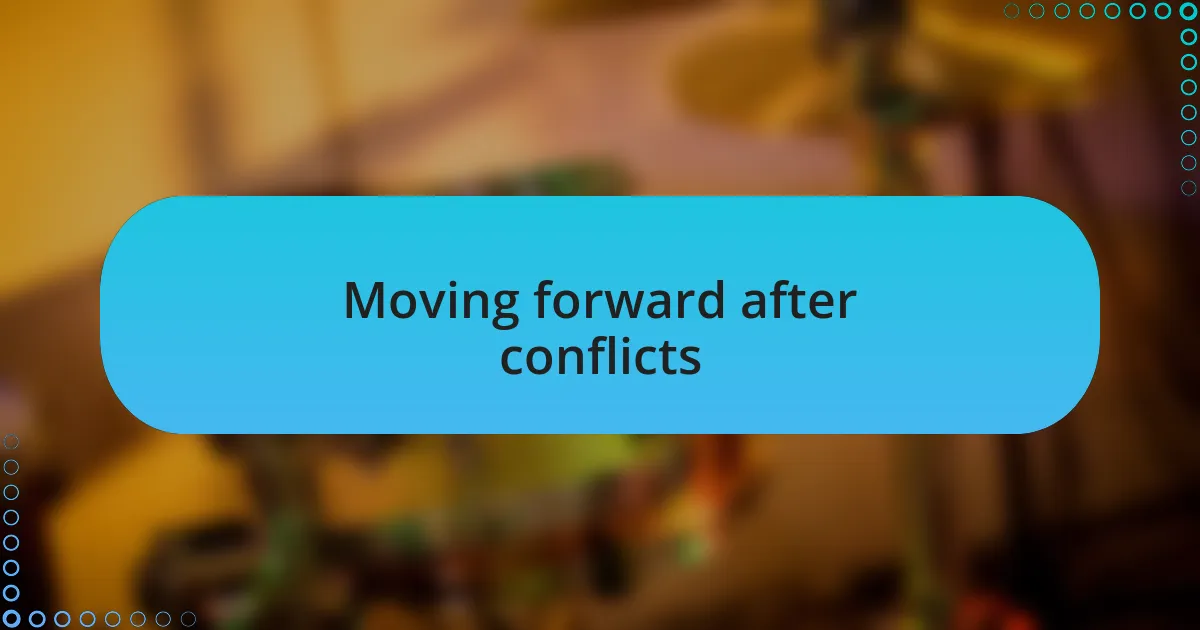
Moving forward after conflicts
Finding the way forward after a conflict involves more than just resolving the immediate issue. I remember a time when we faced a significant creative disagreement that left tensions high. Instead of diving right back into our music, we took some time to regroup and talk it out. That decision allowed us to reestablish trust, which made it easier to collaborate effectively afterward. Have you noticed how discussions can often lead to unexpected solutions?
Another important aspect of moving forward is learning to appreciate the lessons embedded in the conflict. After a particularly challenging rehearsal where frustrations escalated, we decided to look back at what triggered the heated moment. By identifying the underlying issues, we were able to not only mend our relationship but also improve our communication strategies as a band. Have you ever found that reflecting on past conflicts helps prevent future misunderstandings?
Sometimes, it’s all about fostering a culture of open dialogue. In our band, after facing a serious split over creative direction, we began to implement weekly check-ins, ensuring everyone’s voice was heard before issues could spiral out of control again. This simple approach not only strengthened our bond but also enhanced our creativity. Have you thought about how regular communication could transform the dynamics in your group?